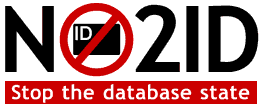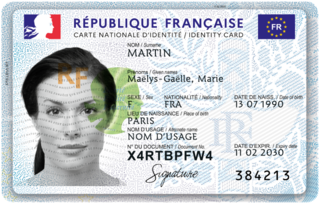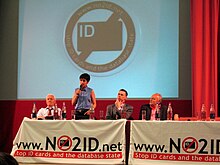An identity document is any document that may be used to prove a person's identity. If issued in a small, standard credit card size form, it is usually called an identity card, or passport card. Some countries issue formal identity documents, as national identification cards that may be compulsory or non-compulsory, while others may require identity verification using regional identification or informal documents. When the identity document incorporates a person's photograph, it may be called photo ID.

The Identity Cards Act 2006 was an Act of the Parliament of the United Kingdom that was repealed in 2011. It created national identity cards, a personal identification document and European Economic Area travel document, linked to a database known as the National Identity Register (NIR), which has since been destroyed.

NO2ID is a public campaign group, formed in 2004 to campaign against the United Kingdom government's plans to introduce UK ID Cards and the associated National Identity Register (NIR), which it believes has negative implications for privacy, civil liberties and personal safety. The NIR and ID cards were abolished by the Identity Documents Act 2010. Since then, it has been involved in other campaigns.

The Real ID Act of 2005 is an Act of Congress that modifies U.S. federal law pertaining to security, authentication, and issuance procedure standards for drivers' licenses and identity documents, as well as various immigration issues pertaining to terrorism.
Identity documents in the United States are typically the regional state-issued driver's license or identity card, while also the Social Security card and the United States Passport Card may serve as national identification. The United States passport itself also may serve as identification. There is, however, no official "national identity card" in the United States, in the sense that there is no federal agency with nationwide jurisdiction that directly issues an identity document to all US citizens for mandatory regular use.

A British passport is a travel document issued by the United Kingdom or other British dependencies and territories to individuals holding any form of British nationality. It grants the bearer international passage in accordance with visa requirements and serves as proof of citizenship. It also facilitates access to consular assistance from British embassies around the world. Passports are issued using royal prerogative, which is exercised by His Majesty's Government; this means that the grant of a passport is a privilege, not a right, and may be withdrawn in some circumstances. British citizen passports have been issued in the UK by His Majesty's Passport Office, an agency of the Home Office, since 2014. All passports issued in the UK since 2006 have been biometric.

The French national identity card is an official identity document consisting of an electronic ID-1 card bearing a photograph, name and address. While the identity card is non-compulsory, all persons must possess some form of valid government-issued identity documentation.

The Hong Kong identity card is an official identity document issued by the Immigration Department of Hong Kong. According to the Registration of Persons Ordinance, all residents of age 11 or above who are living in Hong Kong for longer than 180 days must, within 30 days of either reaching the age of 11 or arriving in Hong Kong, register for an HKID. HKIDs contain amongst others the name of the bearer in English, and if applicable in Chinese. The HKID does not expire for the duration of residency in Hong Kong.

The United States passport card is an optional national identity card and a travel document issued by the U.S. federal government in the size of a credit card. Like a U.S. passport book, the passport card is only issued to U.S. nationals exclusively by the U.S. Department of State, compliant to the standards for identity documents set by the REAL ID Act, and can be used as proof of U.S. citizenship and identity. The passport card allows its holders to travel by domestic air flights within the U.S., and to travel by land and sea within North America. However, the passport card cannot be used for international air travel.

Aadhaar is a 12-digit unique identity number that can be obtained voluntarily by the citizens of India and resident foreign nationals who have spent over 182 days in twelve months immediately preceding the date of application for enrolment, based on their biometric and demographic data. The data is collected by the Unique Identification Authority of India (UIDAI), a statutory authority established in January 2009 by the Government of India, under the jurisdiction of the Ministry of Electronics and Information Technology, following the provisions of the Aadhaar Act, 2016.

The Identity Documents Act 2010 is an Act of Parliament in the United Kingdom which reverses the introduction of identity cards, and requires the destruction of the information held on the National Identity Register.

The Finnish identity card is one of two official identity documents in Finland, the other being the Finnish passport. Any citizen or resident can get an identification card. Finnish citizens will get indication of citizenship on the card. It is available as an electronic ID card, which enables logging into certain services on the Internet, local computers or adding digital signatures into LibreOffice ODF documents or creating DigiDoc formatted containers that also allows encryption during content transfer. ID card is applied at a police station and it is issued by the police.

A voter identification law is a law that requires a person to show some form of identification in order to vote. In some jurisdictions requiring photo IDs, voters who do not have photo ID often must have their identity verified by someone else or sign a Challenged Voter Affidavit in order to receive a ballot to vote.

The Greek identity Card is an official document of the Hellenic Republic, and the official national identification document for Greek citizens.
Biometrics refers to the automated recognition of individuals based on their biological and behavioral characteristics, not to be confused with statistical biometrics; which is used to analyse data in the biological sciences. Biometrics for the purposes of identification may involve DNA matching, facial recognition, fingerprints, retina and iris scanning, voice analysis, handwriting, gait, and even body odor.

National identity cards are issued to their citizens by the governments of all European Economic Area (EEA) member states except Denmark, Iceland and Ireland. Ireland however issues a passport card which is a valid document in the EEA and Switzerland. Denmark and Iceland issue simpler identity cards that are not valid as travel documents. From 2 August 2021, new identity cards are harmonized as a common identity card model replaced the various formats already in use.

The Norwegian identity card, commonly referred to as the national identity card in Norway, is a non-compulsory biometric identity document issued since 30 November 2020. It is one of two official identity documents issued by the Norwegian Police Service, the other being the Norwegian passport. It is only issued to Norwegian citizens, and may indicate citizenship so that it can be used as a travel document facilitating freedom of movement within the European Free Trade Association and the European Economic Area. For travel within the Nordic countries no identity documentation is legally required for Nordic citizens due to the Nordic Passport Union.
The National Identity Card or NID card is a compulsory identity document issued to every Bangladeshi citizen upon turning 18 years of age. The NID is a government issued photo ID just like the Bangladeshi Driver's license, which is also a biometric, microchip embedded, smart identity card. The NID is required by Bangladeshi citizens for multiple essential public services, such as obtaining utility connections, as well as private services, such as opening bank accounts, in Bangladesh. Initially, paper based laminated NID cards were issued since 2006. Then, the paper based laminated NID cards were replaced by biometric and microchip embedded Smart NID cards for all adult citizens in Bangladesh from 2016 onwards. This was done to ensure security for the cardholder as well as prevent counterfeiting and fraudulence. The government provides the Smart NID card free of charge to all adult citizens of Bangladesh.
Australia does not have a national identity card. Instead, various documents may be used or required to prove a person's identity, whether for government or commercial purposes such as:












